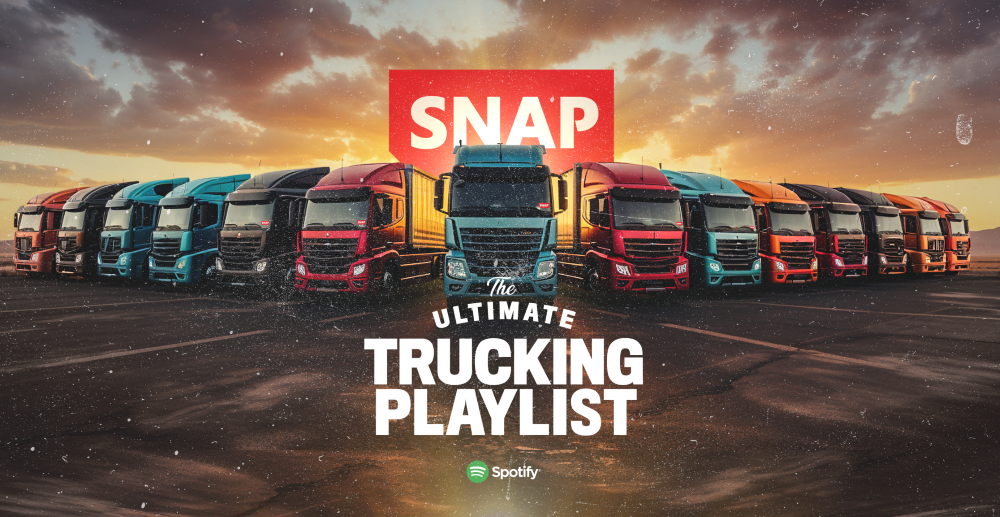
Susie Jones
El poder de la música en el sector del transporte por carretera
Creado: 28/08/2024
•
Actualizado: 28/08/2024
Para los camioneros que atraviesan sin cesar el Reino Unido y Europa, la música es algo más que ruido de fondo: es una compañera que alivia el aburrimiento y les mantiene alerta, comprometidos y concentrados en el viaje que tienen por delante. La música puede mejorar el bienestar del conductor y aumentar la seguridad en la carretera.
Por qué la música es importante para los camioneros
Con muchas horas en la carretera y días lejos de amigos y familiares, la vida de un camionero puede ser a veces un asunto solitario. La música puede cambiar un viaje levantando el ánimo y manteniendo al conductor concentrado en la carretera. También puede proporcionar tranquilidad y calma durante los tiempos muertos del conductor.
Música y seguridad del conductor
La música no sólo evita el aburrimiento en la carretera, sino que también puede afectar a la seguridad vial. Un estudio demostró que la música alta (por encima de 95 decibelios) puede reducir el tiempo de reacción hasta en un 20%. El estudio también demostró que la música a 55 decibelios mejora el rendimiento al volante: los mismos conductores obtuvieron mejores resultados que los que no llevaban música.
La música también puede alterar su estado de ánimo en situaciones de estrés: el rock suave y el jazz pueden mejorar la atención y la concentración del conductor. Los amantes de la música rápida deben tener cuidado. Las pruebas han demostrado que la música con pulsaciones más altas por minuto tiene más probabilidades de hacer que conduzcas rápido y subestimes tu velocidad. En algunos casos, la música más rápida provocaba zigzagueos, desobediencia a los semáforos en rojo y un mayor índice de colisiones.
Según una investigación realizada por Autotrader, las mejores canciones para conducir camiones proceden de artistas pop, ya que mejoran la concentración: en el estudio se puntuaron una serie de pruebas de percepción de peligros mientras se escuchaban listas de reproducción de 20 artistas diferentes. Drake quedó en cabeza con una puntuación de 59,5/75, mientras que Ariana Grande y Eminem quedaron en segundo lugar con puntuaciones de 58,5/75.
El efecto sobre la salud física y mental
La Fundación JED descubrió que la música es beneficiosa para la salud mental por varias razones:
Distracción: la música puede distraerte de tus problemas y servirte de vía de escape.
Niveles de estrés - Ciertos tipos de música pueden reducir los niveles de cortisol, con la consiguiente reducción del estrés. Escuchar música que te gusta también libera endorfinas, que te dan una sensación de bienestar.
Activa el cerebro - Una encuesta realizada por AARP reveló que quienes escuchaban música con regularidad veían disminuir sus niveles de ansiedad y depresión. Además, el 69% de los que asistían a menudo a actuaciones musicales calificaron su salud cerebral de excelente o muy buena.
La canción favorita de alguien puede levantarle el ánimo al instante.
La música no sólo afecta a la salud mental, sino también a la salud física del conductor. Un estudio realizado por varias universidades de Brasil, Reino Unido e Italia sugiere que escuchar música influye en el estrés cardiovascular. El estudio constató una reducción del estrés cardíaco al escuchar música mientras se conduce.
The Ultimate Trucking Playlist
The Ultimate Trucking Playlist ha sido creada para conductores, por conductores. Cada semana, pedimos a nuestra comunidad de camioneros que voten qué canciones les gustaría escuchar en la carretera. Asegúrate de que tu canción favorita está en la lista visitando nuestra página de Facebook.

¿Ven la tele los camioneros?
Muchos conductores pasan las horas que pasan al volante viendo programas de televisión y películas. Los servicios de streaming han facilitado más que nunca el acceso de los conductores a los últimos estrenos. Además, muchos camiones están equipados con opciones de montaje de satélite, lo que permite a los conductores ver la televisión en directo desde la comodidad de su cabina.
¿Escuchan audiolibros los camioneros?
La música desempeña un papel fundamental en el viaje de un camionero, pero no es lo único que aleja el aburrimiento en los trayectos largos. Tras hablar con un grupo de camioneros sobre sus preferencias auditivas, Road Pro descubrió que los audiolibros ocupaban el segundo lugar, por delante de la radio tradicional.
El uso de audiolibros al volante ha sido objeto de escrutinio, ya que muchos sugieren que son una distracción. Aunque es más fácil desconectar de la música, eso no significa que los audiolibros sean inseguros. Los estudios han descubierto que muchos conductores no se ven perjudicados por escuchar un audiolibro, pero sólo en trayectos "aburridos". A los conductores en terrenos más traicioneros les resultaba difícil reaccionar con rapidez.


